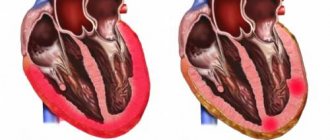Colon cancer is a type of disease that includes cancers of the gastrointestinal tract from the cecum to the sigmoid colon. The large intestine includes the colon, which consists of three sections (ascending, transverse and descending). Oncology of this localization is the third most common type among cancer types, accounting for 15% of cancer tumors.
The second name for intestinal cancer is colorectal cancer. It refers to cancers localized in any part of the colon, but more often adenocarcinomas are formed in the intestines - pathologies of the intestinal walls that produce mucus. This type of disease accounts for 96% of cases. Varieties of oncological pathology, signet ring cell carcinoma and mucous form, have a less favorable prognosis for the patient than with other types of the disease. Intestinal cancer occurs equally often in men and women; gender does not play a role in determining risk groups for cancer.
Causes of colon tumor
Researchers have identified the following main causes of colorectal cancer:
- Genetic predisposition;
- Elderly age. After 55 years of age, the likelihood of developing a malignant tumor in the colon increases;
- Chronic inflammatory diseases in the large intestine;
- Excessive consumption of fatty foods, foods with refined carbohydrates;
- Metabolic diseases;
- Polyps in the colon;
- Low physical activity. When the balance between physical activity and the amount of calories consumed is disturbed, excess body weight occurs;
- Urbanization. Colorectal cancer is typical for industrialized countries, which experts associate with the nature of nutrition;
- Tobacco smoking;
- Chronic alcoholism.
A malignant tumor of the large intestine develops over 12-15 years. This disease is characterized by late detection, which reduces the likelihood of a favorable outcome. Modern high-precision diagnostic equipment used by oncologists at the Yusupov Hospital allows the patient to quickly identify the pathological process.
Microsatellite instability in colorectal cancer
Oncologists have proven that microsatellite instability in colorectal cancer is the cause of the development of the disease in 5% of cases. Microsatellite instability is characterized by the tendency of DNA to mutation under the influence of various factors. The medical literature describes two pathways for the development of genetic instability. The first mechanism for the development of colorectal cancer is associated with chromosomal abnormalities.
Malignant tumors of the colon, when the second pathway is activated, are associated with disruption of the repair process. Mutations occur spontaneously in the body; damage to DNA molecules can be caused by chemical reagents or physical factors. During the repair process, enzymatic systems contribute to the restoration of DNA sections.
Microsatellite instability in colorectal cancer is characterized by the presence of several genes in the DNA, mutations of which cause phenotypic abnormalities. The medical literature describes in detail the mechanism of development of colorectal cancer under the influence of mutations, which allows specialists to determine the most effective methods of therapy.
Difficulties in diagnosing colon cancer are due to the fact that the disease in different parts of the large intestine is due to different reasons. Treatment of colorectal cancer is based on the results of comprehensive diagnostics, which is a mandatory element of care for patients with colon cancer at the Yusupov Hospital. The oncology clinic employs highly qualified specialists. They provide assistance even to those patients who were abandoned by other medical institutions.
Causes
The causes of colon cancer are still under study. There are certain factors that can increase the likelihood of developing cancer. These same factors influence how long bowel cancer takes to develop. These factors include:
- Heredity. A genetic predisposition to developing cancer automatically puts a person at risk. If there is a family history of cancer, a person needs to be especially careful about his health and treat diseases in a timely manner;
- Various intestinal diseases. The development of cancer is often preceded by inflammatory and tumor diseases of the intestinal mucosa: polyps, adenomas, Crohn's disease, ulcerative colitis. These diseases are not malignant, but can create conditions for the appearance of cancer cells;
- Poor nutrition. Eating too fatty foods, large amounts of simple carbohydrates, and lack of fiber foods leads to constipation. Dense feces can disrupt the integrity of the intestinal walls, causing microcracks and disrupting its function. This can lead to the degeneration of healthy cells into malignant ones;
- Bad habits. Cigarettes, alcohol, and drugs are carcinogens and provoke cell degeneration;
- Environmental influence. A polluted atmosphere and constant contact with harmful substances (asbestos, mercury, etc.) can cause cancer of various organs and systems.
How long intestinal cancer develops is an individual question. This will depend on the general health of the person and the intensity of the influence of the provoking factor.
Types of metachronous cancer
Symptoms of rectal cancer depend on the location of the tumor and its structure. Determining the nature of the tumor is necessary to determine treatment tactics, the rate and nature of tumor growth. Based on the nature of their growth, the following types of malignant neoplasms of the colon are distinguished:
- Exophytic colon cancer manifests itself in the growth of the tumor outward;
- Endophytic colon cancer is characterized by inward growth of the tumor;
- Mixed form (combines both types of tumor, in some cases it is an ulcer).
In oncology, the International Histological Classification of Cancer is used. Epithelial tumors are divided into several types:
- Tubular adenoma of the sigmoid colon;
- Tubular villous adenoma of the colon;
- Villous tumor of the rectum or other parts;
- Adenomatous polyp.
These neoplasms are benign, but colon cancer can develop against their background. In this regard, tubular adenoma of the colon requires regular monitoring. The following histological types of colon cancer are distinguished:
- Adenocarcinoma;
- Squamous cell carcinoma;
- Solid cancer;
- Melanoma;
- Scirrhous cancer;
- Signet ring cell carcinoma.
Depending on the degree of differentiation of the cells that make up the tumor, the following types of rectal cancer are distinguished:
- Highly differentiated formations, which contain more than 95% glandular structures;
- Moderately differentiated tumors - have from 50 to 90% glandular structures in the cells;
- Poorly differentiated tumors - glandular elements occupy from 5 to 50% of cells;
- Undifferentiated - contain less than 5% glandular cells.
Determining the type of colon cancer is necessary to select further treatment tactics, therefore, highly accurate diagnostics are carried out at the Oncology Clinic of the Yusupov Hospital.
Make an appointment
After 40 years of age, screening is recommended
All over the world, oncologists note an increase in the incidence of colorectal cancer, and as a person ages, the risk of developing the disease increases. In order to diagnose cancer in a timely manner, the American Cancer Society and the US National Cancer Institute recommend that the population of all countries undergo screening for colorectal cancer using the following method:
- conduct a digital rectal examination annually for persons over 40 years of age;
- perform a stool occult blood test annually for people over 50 years of age;
- Every 3-5 years, conduct fibrocolonoscopy for people over 50 years of age.
In Ukraine, taking into account the increased radiological situation, fibrocolonoscopy should be performed every 2 years.
Every resident of Ukraine can carry out diagnostics in order to identify the disease in advance. To do this, you need to make an appointment with a proctologist in your city.
Remember! Cancer diagnosed in a timely manner can be effectively treated.
Colon Cancer Symptoms
There are no signs of cancer of the rectum and other parts of the large intestine at the initial stage of development, so the disease is discovered accidentally during an intestinal examination or medical examination. Symptoms of colon cancer in women coincide with the general manifestations of the disease. In order to successfully treat colorectal cancer, symptoms in the early stages should not be ignored by the patient.
Comprehensive diagnostics using high-precision equipment allows specialists at the Yusupov Hospital to determine the causes of the problem and identify problems at an early stage. At the initial appointment, the oncologist carefully examines the symptoms of colorectal cancer in women, as well as hereditary predisposition.
In men, a rectal tumor, which may have no symptoms, develops in 60% of cases. Signs of rectal cancer and the first symptoms cause patients to turn to oncologists at a stage when the likelihood of a favorable prognosis is reduced. Experts note that colon cancer has signs and symptoms that are the same for women and men.
A tumor in the large intestine of a small size at the initial stage of formation does not cause pain or discomfort. As colon cancer increases in size, it manifests itself with the following symptoms:
- Pain in the abdominal area;
- Feeling of heaviness;
- Increased formation of gases in the abdomen;
- Irregular bowel movements.
If colon cancer develops, the first symptoms may not cause concern to the patient for a long time and may be mistaken for an upset stomach. At the Yusupov Hospital, colon cancer is diagnosed and symptoms are studied in the early stages to develop the most effective treatment program.
Symptoms of colorectal cancer in the early stages in women include decreased performance and intense headaches. In the later stages of the tumor process, damage to internal organs occurs, so general symptoms arise:
- Anemia – develops due to a lack of iron in the body as a result of regular bleeding. It manifests itself as pale skin, weakness, dizziness, brittle hair and nails. Leads to dysfunction of internal organs;
- Loss of body weight for no apparent reason. The development of a tumor always causes weight loss. Weight loss occurs due to dysfunction of the digestive system and metabolism.
Appetite worsens during chemotherapy or due to depletion of all the body's resources.
Ascending colon cancer
Cancer of the ascending colon is often characterized by the development of anemia in the early stages of the disease. This is associated with a neuroreflex effect on the part of the ileocecal segment of the intestine, which leads to impaired hematopoiesis. Malaise, fatigue, and body temperature rise. All these symptoms indicate the development of negative processes in the colon.
Metachronous colon cancer
Metachronous colon cancer most often develops after age 50. In first place is metachronous (multiple) sigmoid colon cancer, in second place is metachronous rectal cancer. Manifestations of primary multiple forms of cancer are diverse, symptoms are characteristic of a solitary tumor. There is weakness, severe pain, discharge with blood and mucus from the rectum, loss of appetite, rapid weight loss, constipation. Less commonly, the patient complains of bloating, tenesmus and loose stools.
Local manifestations of colon cancer
If sigmoid colon cancer develops, the first symptoms of the disease are similar to the pathological process in other parts of the intestine. Local manifestations of colon cancer are:
- Discomfort in the abdominal area resulting from microflora disturbances;
- Alternating constipation and diarrhea;
- Mucus and blood in stool. If sigmoid colon cancer develops, these symptoms differ in that inclusions envelop the stool. In case of cecal cancer, symptoms are characterized by mixing of blood and feces.
At the Yusupov Hospital, every person who applies receives help, regardless of the severity of the disease, so the first signs of rectal cancer do not go unattended.
Stages
Oncologists distinguish several stages of rectal cancer according to the TNM classification.
T indicates the extent of the primary tumor in the colon:
- TX – insufficient data to assess the primary tumor site;
- T0 – the primary tumor in the intestine cannot be determined;
- Tis – the tumor grows within the mucous membrane;
- T1 – tumor grows into the submucosa;
- T2 – the tumor grows into the muscle layer of the intestinal wall;
- T3 – the tumor grows through all layers of the intestinal wall;
- T4 – the tumor grows into neighboring organs.
N characterizes the presence of cancer cells in regional (located next to the tumor) lymph nodes;
- NX – insufficient data to evaluate regional lymph nodes;
- N0 – lymph nodes are not affected;
- N1 – metastases were found in 1-3 regional lymph nodes;
- N2 – metastases were found in 4 or more regional lymph nodes.
M indicates the presence of distant metastases in various organs:
- M0 – no distant metastases;
- M1 – there are distant metastases.
When making a diagnosis, oncologists also use another classification, according to which colon cancer goes through 4 stages:
- The first stage is characterized by tumor growth into the wall of the organ, but it does not spread beyond its boundaries. At this stage, there are no metastases in regional lymph nodes, so the five-year survival rate exceeds 90%. Tubular adenoma of the colon with grade 1 dysplasia can develop in a patient asymptomatically;
- The second stage - the neoplasm extends beyond the intestine, metastases are not detected in the lymph nodes. Stage 2 rectal cancer has a survival rate of up to 75%;
- The third stage is characterized by tumor growth into the serosa and metastasis to the lymph nodes. Stage 3 rectal cancer has a favorable prognosis in 50% of cases;
- The fourth stage is terminal. The tumor affects nearby organs, and the formation of metastases is noted. If stage 4 rectal cancer is diagnosed, life expectancy is reduced: only 10% of patients survive the first five years.
Stage 4 sigmoid colon cancer brings patients pain and worsens psychological health. When treating patients with stage 4 rectal cancer, an experienced psychologist works with patients every day.
Forecast
The earlier cancer is diagnosed, the greater the patient's chances of successful survival. When cancer is diagnosed at the first stage, the probability that the patient will live with this diagnosis for five years or more is above 90%. The second stage of cancer suggests a five-year survival rate of 70%. 40-50% of patients live with the third stage of intestinal cancer for about five years or more, but the disease, recognized at the last stage, means that the patient with cancer has little chance of living long: less than 10% of patients survive up to five years with this diagnosis.
Prognosis reports a 65% five-year survival rate among patients with colon surgery. The chances are lower for patients whose lymph nodes are affected by the disease. The likelihood of an unfavorable outcome is influenced by:
- size of the operated tumor;
- damage to the intestinal walls;
- location of the tumor.
If a small tumor is treated, the probability of surviving five years or more reaches almost 90%. If only the epithelial layer of the intestine (mucosal and submucosal layer) is affected, the likelihood of a long and comfortable life is present in 95% of patients.
If the tumor does not affect the lymph nodes, then 70% of patients will have a five-year survival rate. Reduces the chances of the tumor spreading to other tissues and organs - 40% of people survive and live a relatively long time. The higher and further from the cecum and rectum the tumor is located, the greater the likelihood of high patient survival.
Symptoms of cancer by stage
Symptoms of the first stage of colon cancer appear in the form of periodic intestinal discomfort, constipation or stool disorders. At this stage, the primary tumor of the intestinal mucosa and submucosa grows. Streaks of blood and mucus may appear in the stool.
Signs of stage 2 colon cancer are also inexpressive: periodic constipation, stool upset, flatulence, abdominal pain, belching, heartburn, streaks of blood and mucus in the stool may appear.
Manifestations of the third stage of colon cancer include:
- Pain in the abdomen, stomach;
- Copious discharge of blood and mucus in the stool;
- Flatulence;
- Constipation that cannot be treated;
- Frequent nausea, occasional vomiting.
A tumor is often detected during palpation, depending on its location. The examination reveals regional lymph nodes affected by metastases.
Symptoms of the fourth stage of colon cancer are characterized by severe pain in the abdomen, blood in the stool, the appearance of purulent discharge caused by inflammation of the tumor itself, and the development of an abscess. The patient loses a lot of weight, loses appetite, develops iron deficiency anemia, and intestinal obstruction.
Make an appointment
Metastases
Movement of the pathological focus is a common phenomenon in colon cancer. Stage 4 rectal cancer with metastases is difficult to treat; the efforts of oncologists are aimed at improving the patient’s quality of life and reducing the negative impact of the decomposition of damaged tissues.
Metastasis of malignant tumors in the large intestine occurs in the following organs:
- The liver receives blood that nourishes the internal organs. Stage 4 sigmoid colon cancer with liver metastases manifests itself in patients with accumulation of fluid in the abdominal cavity, nausea and vomiting, jaundice and general exhaustion of the body;
- The peritoneum is a thin film that lines the internal organs; after the tumor grows into the organs, foci of the pathological process appear in the peritoneum;
- When cancer metastasizes to the lungs, patients experience severe chest pain, coughing attacks, shortness of breath, and bleeding occurs when coughing.
Modern diagnostic equipment allows oncologists at the Yusupov Hospital to quickly identify metastases in colon cancer and provide adequate therapy. Stage 4 colon cancer with liver metastases has an unfavorable prognosis, however, experienced oncologists at the Yusupov Hospital provide palliative care to patients.
Reviews from our patients
- Bowel cancer. Review of treatment
Bowel cancer. Review of treatment January 11, 2021The patient was admitted with intestinal disease. During the hospitalization period, control examinations were carried out. The first course of chemotherapy was completed. Further treatment tactics have been determined.
read more
- Feedback on hemicolectomy
Review of hemicolectomy May 11, 2021
The patient was admitted to us in critical condition. The diagnosis is intestinal obstruction due to cancer. The illness came unexpectedly. The only hospital in the community was repurposed to fight coronavirus. The patient went to a paid medical center, but they could not help. The condition gradually worsened. When contacting us, the patient promptly underwent surgical intervention involving a left-sided hemicolectomy. The patient tolerated the operation well. Recovery period...
read more
- For treatment from Vladivostok to Moscow
For treatment from Vladivostok to Moscow on May 7, 2021.
What to do if cancer is complicated by heart problems? You will be helped at the Medicine 24/7 clinic. The patient came to us from Vladivostok with her sister. Cancer is complicated by heart rhythm disturbances. The patient might not have been able to endure the complex operation. An interdisciplinary consultation was held to determine treatment tactics. The patient was fitted with a pacemaker, which will help her in the future. The next day, May 1, an operation was performed to resection the tumor….
read more
How is metastatic cancer treated?
In case of metastases to other organs and a small size of the primary formation, which can technically be removed, everything is determined by the possibility of removing these metastases. If there are few of them and it is technically possible to remove all metastases including part of the lung or liver, then a one-stage surgical intervention is performed on the intestines and metastatic foci. Good results are achieved with radiofrequency ablation of liver metastases. Next, the patient undergoes prophylactic adjuvant chemotherapy.
For small cancers that do not threaten complications - obstruction and bleeding, another tactic is possible, when the surgical stage is carried out after several courses of chemotherapy, then the affected part of the colon and metastatic foci are removed simultaneously or at intervals. Postoperative drug therapy is adjusted to a total duration of six months.
When, with multiple metastases, there remains a danger of complete blocking of the lumen of the intestinal tube by cancer, the issue of palliation is resolved with the formation of a colostomy above the tumor conglomerate, which will prevent fatal intestinal obstruction. The patient is prescribed cyclic chemotherapy.
Diagnostics
Diagnosis of sigmoid colon cancer is performed at the Yusupov Hospital. Patients undergo a comprehensive examination. Early diagnosis improves the survival rate of patients with cancer. The diagnosis of rectal cancer is made based on data from numerous studies. The proctologist performs a digital examination of the rectum.
If the rectum and sigmoid colon are affected, sigmoidoscopy is performed. The main method for diagnosing colon cancer is colonoscopy. This is an endoscopic examination that allows the doctor to examine all parts of the colon and collect material for histological examination. Colonoscopy has the following advantages:
- Determining the exact location of the tumor;
- Clarification of the extent of the lesion;
- Detection of synchronous precancerous or cancerous lesions;
- Removal of polyps during the study.
At the Yusupov Hospital, to improve diagnostic accuracy, functional diagnostic doctors use the chromoendoscopic method - the mucous membrane is stained with special dyes. This makes it possible to identify pathological changes at an early stage and select areas for targeted biopsy. If for anatomical reasons it is not possible to examine the right parts of the large intestine and patients have multiple adenomas, irrigoscopy is used in addition to colonoscopy.
Radiologists at the Yusupov Hospital use the following methods for examining the intestines:
- Computed tomography. This method is highly accurate; it is based on obtaining many layer-by-layer images of a certain area of the body. Colorectal cancer, the symptoms and diagnosis of which are quite complex, can metastasize, so computed tomography is used to determine secondary lesions;
- Irrigoscopy with contrasting barium suspension. The method is based on the introduction of barium sulfate into the intestines, after which an x-ray examination is performed. This substance has the ability to absorb x-rays. A barium enema allows radiography to visualize the affected area of the colon;
- Magnetic resonance imaging - used to visualize the area under study. This method is the safest, since it is based on the use of electromagnetic radiation;
- Positron emission tomography – allows you to clarify the boundaries of tumor spread using labeled radioisotopes;
- Chest X-ray - used to detect metastases in distant organs.
X-ray diagnostic methods are used to determine the presence of a tumor in the large intestine and its location. In medicine, there are also methods for determining the origin of a neoplasm, its histological structure and the nature of disorders in the body.
The likelihood of developing colorectal cancer is high in those people whose relatives have this disorder. There is medical evidence that describes the presence in DNA of genes responsible for the development of colon cancer. Activation of these genes occurs when the body is exposed to negative factors, therefore, to identify the likelihood of cancer, it is necessary to undergo genetic testing. Oncologists at the Yusupov Hospital tell patients how to undergo screening for colorectal cancer. Genetic research is aimed at identifying genetic disorders that can trigger the pathological process.
If colon cancer is suspected, several laboratory tests are performed:
- A blood test is necessary to detect anemia, which develops as a result of bleeding from cancer. The presence of a pathological process is confirmed by violations of antigen receptors located on the surface of the cell membrane. A blood test allows you to accurately determine the degree of development of the lesion;
- Examination of feces. With colon cancer, blood enters the stool; in small quantities it may be invisible to the patient. Before the diagnosis, the patient requires special preparation, including avoiding eating fish, meat, and beets. Occult blood in stool can be present in various diseases, so other methods are used for accurate diagnosis;
- Biopsy - taking tissue samples from the tumor and lymph nodes.
To confirm the diagnosis of colon cancer and verify the tumor, a morphological study of the material obtained as a result of a biopsy is performed. At the Yusupov Hospital, the examination is performed by highly qualified histologists.
Description of the microslide in the presence of colon adenocarcinoma includes:
- Histological type of tumor;
- Degree of malignancy;
- The level of tumor growth into the intestinal wall and neighboring organs;
- The presence of atypical cells in the area located between the tumor and the resection margin;
- The presence or absence of vascular or perineural invasion;
- The number of removed lymph nodes and their damage to cancer cells.
Ultrasound examination allows you to visualize the tumor and describe in detail its size, location and determine whether it has invaded nearby organs. This method is highly informative, but screening allows you to determine whether colorectal cancer is developing.
Colon Cancer Screening
Screening studies conducted by oncologists at the Yusupov Hospital help improve patient survival. These tests allow you to identify the pathological process at an early stage, when there are no symptoms. Colon cancer screening is carried out using three main tests:
- Colonoscopy;
- Analysis of feces for occult blood;
- Visual examination of the mucous membrane using a sigmoidoscope.
Additional studies are:
- Injection into the intestinal lumen in cases of suspected tubular adenoma or colon adenocarcinoma of a contrast agent, followed by X-ray examination;
- Genetic analysis of feces;
- Virtual colonoscopy.
Diagnosis of rectal cancer and pathological processes in other parts of the large intestine at the Yusupov Hospital has a number of advantages:
- Use of European equipment, guaranteeing high accuracy of results;
- No queues and visiting specialists at a convenient time;
- Friendly and respectful attitude of the staff towards each patient;
- Fast processing of results and diagnosis in the shortest possible time.
Oncologists tell the patient what rectal cancer looks like and what the prognosis is for this disease. During the examination, the doctor informs patients how to distinguish hemorrhoids from rectal cancer, offers to undergo diagnostics and begin treatment for the disease.
Reviews from our patients
- Mammary cancer. Review of treatment
Mammary cancer. Review of treatment January 25, 2021The patient was admitted to the Medicine 24/7 clinic with breast disease. Based on the results of a comprehensive examination, the tumor was verified. Treatment tactics have been selected. A venous port system was installed. The first course of chemotherapy was completed.
read more
- Bladder cancer. Review of treatment
Bladder cancer. Review of treatment January 22, 2021
The patient was admitted with a bladder disease. During hospitalization, a cystoscopy with a biopsy of tumor material was performed. Based on the examination results, treatment tactics were developed and a course of chemotherapy was administered. The patient's condition has improved. He was discharged home.
read more
- Oncology treatment. Patient's review
Oncology treatment. Patient review January 21, 2021
Oksana Aleksandrovna is undergoing chemotherapy courses. She notes the high level of service and professionalism of doctors. The patient expresses special gratitude to her attending physician and the nurse who administers the drug injections. As Oksana Aleksandrovna notes, during her treatment she developed friendly relations with them.
read more
- Stage IV cervical cancer. Review of treatment
Stage IV cervical cancer. Review of treatment January 20, 2021
The patient was hospitalized with stage IV cervical disease. The examination showed signs of tumor disintegration. Surgical treatment was performed to stop the consequences of this process and prepare the patient for further treatment. At the first stage, the primary tumor was removed and bilateral nephrostomy was performed. At the second stage, a sigmostoma was installed, and sonation and drainage of the abdominal cavity were performed. Hospitalization goals have been achieved. Favorable conditions have been created for further treatment...
read more
- Carrying out chemotherapy. Patient's review
Carrying out chemotherapy. Patient review January 18, 2021
The patient was admitted to the Medicine 24/7 clinic for chemotherapy. She expresses gratitude to her attending physician and all the staff. The patient notes that they help here in the most difficult situations.
read more
- Lung cancer. Feedback on verification of diagnosis and initiation of treatment
Lung cancer. Feedback on verification of diagnosis and initiation of treatment January 18, 2021
The patient came to the Medicine 24/7 clinic with an unverified mass in the lung. During hospitalization, a comprehensive examination was performed and a biopsy was taken. The diagnosis has been verified. The first course of chemotherapy was completed.
read more
- Review of treatment
Review of treatment January 18, 2021
The patient entrusted her health to the doctors of the Medicine 24/7 clinic in 2021. Throughout this time, our staff has provided her with an extremely positive experience. The patient notes that the doctors here understand their patients and can explain to them all the details of the treatment. She feels trust in them. This is one of the factors for successful treatment.
read more
What specific diagnostics will be required?
A positive result of histological examination of a piece of tumor taken during an endoscopic examination of the intestine is sufficient to make a diagnosis of cancer.
Next, it will be necessary to clarify the spread of the malignant process, which helps with fluoroscopy with filling the intestines with a contrast agent - irrigoscopy. X-ray photographs show the degree of narrowing of the lumen of the intestinal tube, the spread of the tumor in the intestinal wall and the relationship with the abdominal tissues adjacent to the intestine.
Irrigoscopy is mandatory if it is impossible to perform a total endoscopic examination of the intestine.
Laboratory diagnosis of colon cancer
Laboratory diagnostic methods include testing stool for occult blood to detect bleeding, and determining the level of tumor markers CEA and CA 19.9. Markers do not increase in 100% of cases, but in the future, changes in their levels can be used to monitor the progress of the process and evaluate the effectiveness of treatment.
Mutations of the KRAS and NRAS genes are determined in a piece of tumor tissue, which will allow planning targeted drug therapy.
Blood tests are taken in all cases and repeatedly.
Detection of metastases
In case of established colon cancer, ultrasound of the abdominal cavity and retroperitoneal space is a method of searching for metastases, although inferior in sensitivity and accuracy to CT, supplemented for better results with intravenous administration of a contrast agent.
The favorite organ for the development of metastases is the liver, so liver CT is more than relevant for colorectal cancer. MRI of the liver is necessary to develop treatment tactics for metastatic liver disease.
Chest X-ray can be replaced with a CT scan of the chest cavity, in which even smaller changes are visible, which is not superfluous; colon cancer often metastasizes to the lungs.
Laparoscopy may be required if there is a suspicion of spread of tumor screenings throughout the peritoneum.
Diagnostics should be sufficient, but not excessive; each examination is associated with anxiety, which a cancer patient already has too much of. The specialists of the Medicine Clinic 24/7 are careful with their patients and are united with them by one goal - to make everyone’s life long and as comfortable as possible. Sign up for a consultation
Treatment
Treatment of colorectal cancer with conservative methods is impossible, so surgery is performed to remove the tumor. If a neoplasm is diagnosed, treatment tactics are determined by the degree of damage to the large intestine. Oncologists at the Yusupov Hospital additionally use radiation therapy or chemotherapy to treat colorectal cancer.
The questions of many patients who turn to oncologists are related to whether colorectal cancer can be cured. Early diagnosis and timely therapy improve the prognosis for this disease; at the initial stages of the development of the pathological process, the probability of a favorable outcome is high.
Operations
The main treatment method for rectal cancer is surgery. A malignant tumor is spreading rapidly, so conservative methods cannot stop the pathological process. Preoperative examination includes:
- Examination by an oncologist;
- General and biochemical blood test with assessment of liver and kidney function;
- Determination of the level of tumor marker CEA;
- Performing a colonoscopy;
- Computed tomography of the pelvis, thoracic and abdominal organs.
Several types of operations have been developed depending on the stage of cancer and its location. Surgeons at the Oncology Clinic masterfully perform the following surgical interventions on the colon in the presence of a malignant tumor:
- Laparoscopic resection - this operation is in demand, as it allows you to stop the pathological process with minimal intervention;
- Abdominal-anal resection - characterized by the removal of the affected section of the intestine, after which the surgeon sews both ends and removes the section of the intestine located in the anus;
- Intra-abdominal resection - with this method, the affected area of the intestine is removed; during the intervention, a colostomy can be placed on the anterior wall of the abdomen;
- Obstructive resection, or operation using the Hartmann method, is performed when there is a high probability of prolonged healing of the wound surface. With this method, the surgeon removes the tumor, then removes the colostomy and sutures the other end of the intestine. Subsequently, surgical intervention to suturing the colostomy is possible.
Adenocarcinoma of the sigmoid colon, which is treated surgically, can be successfully treated at the initial stage of development. Oncologists at the Yusupov Hospital provide high-quality medical services and provide psychological support to each patient.
Doctors at the Yusupov Hospital perform the following operations for colon cancer:
- Resection of the ileocecal angle, in which part of the small intestine and the cecum are removed, a primary anastomosis is performed (connection of the small and large intestine);
- Right hemicolectomy, during which the terminal small intestine and ascending colon with the hepatic flexure are removed;
- Resection of the transverse colon with adjacent lymph nodes;
- Left-sided hemicolectomy, when the splenic flexure of the colon and the descending part of the colon are removed;
- Anterior resection of the rectum with removal of the sigmoid colon and the upper ampullary part of the rectum;
- Low anterior resection of the rectum - removal of the upper and middle ampullary sections of the rectum with resection of the sigmoid colon.
Most often, in a planned situation, oncologists form primary anastomoses. Surgeons sew together the two ends of the resected intestinal fragments. During an emergency operation, the intervention consists of additional placement of an ileostomy or colostomy on the anterior abdominal wall.
When a patient undergoes preoperative neoadjuvant chemotherapy or radiation treatment with signs of partial intestinal obstruction, surgeons place intestinal stents using colonoscopy to preserve excretory function. After neoadjuvant treatment, at a meeting of the expert council, the possibility of radical surgery is considered.
In the case of the initial presence of distant metastases, the primary tumor is removed during surgery. Then adjuvant treatment is carried out (chemotherapy, radiation therapy, or a combination of these methods). This approach helps prevent the breakdown of tumor tissue or the development of intestinal obstruction.
Make an appointment
Radiation therapy before surgery
Radiation therapy is one of the components of treatment for rectal cancer. Ionizing radiation promotes the destruction of tumor cells, and healthy cells are also susceptible to its influence. Radiation exposure before tumor removal surgery helps eliminate symptoms. If sigmoid colon cancer is diagnosed, treatment using this method after surgery improves the prognosis.
Colostomy
Treatment of rectal cancer in some cases requires the creation of a colostomy, which is an opening through which gases and feces are removed from the colon. An artificial anus is removed if the following indications are present:
- Damage to a large part of the intestine;
- Inflammatory process after radiation therapy;
- Suppuration and fistulas in the large intestine;
- Impossibility of surgical removal of the tumor;
- High probability of complications when removing a fragment of the colon;
- Germination of formation into organs.
Patients with a colostomy use special containers to collect stool.
Palliative chemotherapy
Chemotherapy treatment is carried out with drugs that have a detrimental effect on atypical cells and reduce the likelihood of metastases. Chemotherapy for rectal cancer is carried out before surgery or after surgery. Chemotherapy is used as the main treatment for tumors that cannot be removed by surgery.
This treatment method has side effects such as nausea, hair loss, diarrhea, inflammation of the mucous membranes and neutropenia. Before the procedure, oncologists warn patients about the possible consequences. Constant laboratory monitoring of the level of formed elements allows doctors at the Yusupov Hospital to timely adjust doses and medications.
Development of the disease
The large intestine is considered the terminal part of the gastrointestinal tract, which begins at the ileocecal valve (the place where the small intestine meets the large intestine) and ends at the anus.
The following sections are distinguished in the large intestine:
- cecum;
- ascending colon;
- transverse colon;
- descending colon (descending section);
- sigmoid colon (rectosigmoid);
- rectum.
When eating junk food, carcinogens are formed in the intestines, which provoke the formation of a tumor. When constipation occurs, carcinogens have a negative effect on the walls of the colon, causing healthy cells to degenerate into cancer cells. They increase in size, and over time the tumor will occupy the intestinal lumen and intestinal obstruction will develop, bleeding and vascular destruction are possible. If you seek treatment late, the tumor can affect vital organs and metastasize.
Diet
Nutrition for colorectal cancer should be balanced. The cooks at the Yusupov Hospital include foods high in plant fiber in the patient’s diet. This measure is aimed at preventing constipation and removing toxins. The therapeutic diet for rectal cancer is an addition to the main therapy.
General dietary recommendations for colon cancer:
- Small meals 5-6 times a day;
- Use of fresh products when preparing food;
- Eating boiled or steamed food;
- Refusal of fatty meats, smoked and pickled foods;
- Exclusion from the diet of carbonated drinks and foods that increase gas formation.
The diet for radiation therapy of the rectum requires the exclusion of coarse, salty foods, which irritate the oral mucosa. Nutrition for colon cancer for patients at the Yusupov Hospital is developed by a nutritionist taking into account individual preferences. The diet includes fresh foods
Causes of malignant tumors in the intestines
- Smoking comes first
- on the second - nutritional features
- on the third - familial forms (heredity, Crohn's disease and ulcerative colitis)
Nutrition
- The diet of a modern person is rich in protein products (meat and meat products) and depleted in coarse fibers (whole grains, fresh plant foods), this contributes to constipation and a general increase in the presence of a bolus of food in the intestinal cavity.
- Some products formed during the digestion of food of animal origin are carcinogens (skatole, indole); with prolonged contact with the intestinal mucosa, they provoke intestinal metaplasia.
- The abundance in the human diet of products with preservatives, emulsifiers (see emulsifiers cause intestinal inflammation), dyes, flavor enhancers, fried foods (carcinogens), spices, fish (due to small bones) - over a long time also contributes to the development of oncological processes in Gastrointestinal tract.
Gastrointestinal diseases
- Polyps in the intestines (benign formations) can become malignant (in 75% of cases), so they are considered stage zero of oncology and are recommended to be removed.
- Inflammation and ulcers in the mucous wall, Crohn's disease and other gastrointestinal diseases can provoke the appearance of neoplasms.
- Celiac disease - gluten intolerance is also one of the provocateurs of the development of oncology in the intestines.
Prognosis and survival
The prognosis for colon cancer depends on the depth of tumor invasion and the involvement of regional lymph nodes in the pathological process. Important prognostic factors are:
- The degree of differentiation of tumor tissue;
- Perineural or vascular invasion;
- Involvement of resection edges in the pathological process.
Unfavorable signs include perforation of the tumor, intestinal obstruction, increased levels of tumor markers CA 19.9 and CEA.
The five-year survival rate after surgical removal of the tumor is 85-95% for the first stage, 60-80% for the second stage, and 30-60% for the third stage. In the presence of single metastases to the liver, surgeons perform partial resection of the organ. After surgery, the five-year survival rate is 40%. After removal of metastases in the lungs, the five-year survival rate ranges from 35 to 45%. When a well-differentiated colon adenocarcinoma is detected, the prognosis is better than with a poorly differentiated tumor.
The prognosis for moderately differentiated colon adenocarcinoma depends entirely on the stage of the cancer. With timely early diagnosis, oncologists at the Yusupov Hospital are able to carry out radical treatment that prevents relapses and metastasis. If the tumor is detected in the last stages, the prognosis worsens.
Disability group
The decision to issue a disability group is made by the local bureau of medical and social examination.
Criteria for disability group 3:
- The illness led to the patient’s permanent loss of professional skills, and because of this he was forced to resign.
- Placement of a colostomy without disturbances in its emptying.
- 2nd degree of anal dysfunction.
- Moderate defecation disorders.
Criteria for disability group 2:
- deep tumors affecting the entire intestinal wall.
- 3rd degree of anal dysfunction.
- Refusal of radical treatment of the tumor, but the patient is able to care for himself.
- Severe disturbance of the act of defecation or emptying of a colostomy, with nutritional deficiency observed.
Criteria for 1st disability group:
- tumor recurrence.
- The appearance of metastases.
- Impossibility of performing any surgical intervention.
Treatment of colon cancer in Moscow
Treatment of colon cancer in Moscow is carried out by oncologists at the Yusupov Hospital, who are experts in this field. Experienced specialists at the Oncology Clinic provide patients and their relatives with high quality services. After visiting a specialist and diagnosis, treatment for colorectal cancer in Moscow is prescribed in the shortest possible time.
If a patient is diagnosed with colon cancer, oncologists at Yusupov Hospital develop an individual treatment program. You can make an appointment with an oncologist and find out the cost of services by calling the Yusupov Hospital phone number. Contact center specialists answer all questions from patients and their relatives around the clock.
Prevention
Preventing colon cancer is one of the main activities of oncologists at the Yusupov Hospital. The preparation of an individual prevention program is carried out after a comprehensive diagnosis and analysis of the data obtained. Oncologists with many years of experience in treating colorectal cancer offer patients the following areas of prevention:
- Making changes to your diet. One of the provoking factors in the development of this disease is the consumption of red meat, which is cooked at high temperatures, resulting in the formation of carcinogenic substances. Experts recommend minimizing the consumption of these products. In addition, to prevent colon cancer, doctors advise consuming foods rich in fiber, calcium and vitamins A, C, D;
- Quitting drinking alcohol and smoking;
- Timely treatment of inflammatory bowel diseases and prevention of constipation;
- Removal of colon polyps.
Specialists at the Yusupov Hospital draw the attention of patients to the need to undergo annual examinations in case of hereditary predisposition and the presence of provoking factors. In order to undergo an examination using modern equipment if you suspect colon cancer, call the Yusupov Hospital. If doctors rule out the presence of a malignant neoplasm, colon cancer prevention will be carried out.
If a tumor is present, its type and stage will be determined, an individual patient management plan will be drawn up, and adequate treatment will be provided. In the oncology clinic, the patient will be selected for optimal therapy, using the most modern and effective medications with minimal side effects, and will also be provided with dietary nutrition for colon cancer.
Make an appointment
Therapy
Traditional methods of treatment do not cure cancer - everyone should know this. Such drugs can reduce the intensity of symptoms, but they do not affect the growth of malignant cells. If you suspect a pathology, it is much more prudent to consult a doctor who, in the initial stages of cancer development, can get rid of it completely.
Modern medicine makes it possible to treat intestinal cancer, but one extremely important condition is necessary: the disease must be detected at an early stage. When mucosal pathology is diagnosed in the later stages, only half of the patients still have a chance of getting rid of the disease. This is unfortunate, since now less than a quarter of patients receive timely help, and more than 35,000 people in Russia die from bowel cancer every year.
Surgical methods
In the early stages of the development of a cancerous tumor in the intestine, it can be removed surgically and its patency restored (using the fusion technique). After such treatment, the intestines fully perform their function and the possibility of a natural bowel movement remains possible. Thus, in the postoperative period a person can exist comfortably.
The location of some foci of malignant cells does not allow restoration of intestinal patency; in this case, the free end of the healthy intestine is brought out through an opening in the peritoneum (a colostomy is applied). Subsequently, it is necessary to use disposable colostomy bags; this allows you to maintain a relatively comfortable existence.
Radiation and chemotherapy
The use of ionizing radiation and chemotherapy can prevent metastasis and stop tumor growth for a long time. The techniques are used in the postoperative period and when surgical intervention is impossible.











